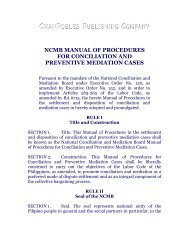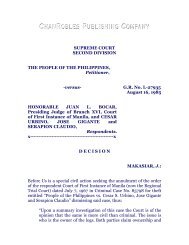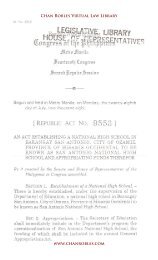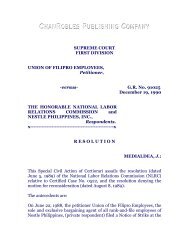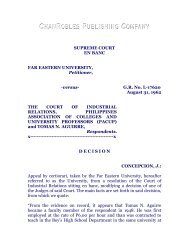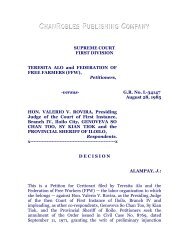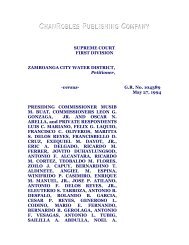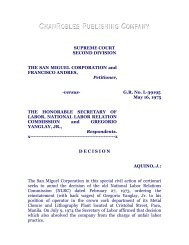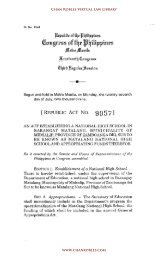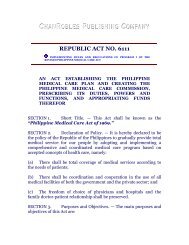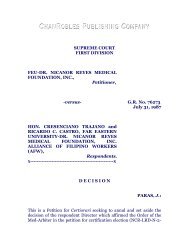part 2 - Chan Robles and Associates Law Firm
part 2 - Chan Robles and Associates Law Firm
part 2 - Chan Robles and Associates Law Firm
You also want an ePaper? Increase the reach of your titles
YUMPU automatically turns print PDFs into web optimized ePapers that Google loves.
Pre-Week Guide on Labor <strong>Law</strong> 2006 Bar Examinations Prof. Joselito Guianan <strong>Chan</strong>present his side in a controversy with either the company or his own union is not wiped away by aunion security clause or a union shop clause in a CBA. An employee is entitled to be protectednot only from a company which disregards his rights but also from his own union the leadershipof which could yield to the temptation of swift <strong>and</strong> arbitrary expulsion from membership <strong>and</strong>mere dismissal from his job.In Malayang Samahan ng mga Manggagawa sa M. Greenfield (MSMG-UWP) vs.Ramos, [G. R. No. 113907, February 28, 2000], petitioner union officers were expelled by thefederation for allegedly committing acts of disloyalty <strong>and</strong>/or inimical to the interest of thefederation (ULGWP) <strong>and</strong> in violation of the Constitution <strong>and</strong> By-laws. Upon dem<strong>and</strong> of thefederation, the company terminated the petitioners without conducting a separate <strong>and</strong> independentinvestigation. Respondent company did not inquire into the cause of the expulsion <strong>and</strong> whether ornot the federation had sufficient grounds to effect the same. Relying merely upon the federation’sallegations, respondent company terminated petitioners from employment when a separateinquiry could have revealed if the federation had acted arbitrarily <strong>and</strong> capriciously in expellingthe union officers. Respondent company’s allegation that petitioners were accorded due processis belied by the termination letters received by the petitioners which state that the dismissal shallbe immediately effective.Before dismissal may be effected by the employer for breach of a union securityagreement, due process must be observed by the employer. The employee sought to be dismissedmust be given the opportunity to be heard. The employer should not rely solely upon the requestof the union. (Liberty Cotton Mills Workers Union vs. Liberty Cotton Mills, 90 SCRA 391;Binalbagan-Isabela Sugar Co., Inc. [BISCOM] vs. Philippine Association of Free Labor Unions[PAFLU], G. R. No. L-18782, Aug. 29, 1953, 8 SCRA 700; Sanyo Philippines Workers Union –PSSLU vs. Canizares, 211 SCRA 361).Employer’s liability in illegal dismissal based on union security clause.The company is liable for the payment of backwages for having acted in bad faith ineffecting the dismissal of the employees. (Liberty Cotton Mills Workers Union vs. Liberty CottonMills, 90 SCRA 391).Thus, as held in the 2000 case of M. Greenfield [supra], notwithst<strong>and</strong>ing the fact that thedismissal was at the instance of the federation <strong>and</strong> that it undertook to hold the company freefrom any liability resulting from such a dismissal, the company may still be held liable if it wasremiss in its duty to accord the would-be dismissed employees their right to be heard on thematter.Effect of Union Security Clause on religious freedom.An employee may not be compelled to join a union if it is based on religious objection.In 1988, the Supreme Court rendered a decision in the case of Kapatiran sa Meat <strong>and</strong>Canning Division [Tupas Local Chapter No. 1027] vs. The Honorable BLR Director PuraFerrer-Calleja, [G. R. No. L-82914, June 20, 1988] where it ruled that the decision in BenjaminVictoriano vs. Elizalde Rope Workers’ Union, [G. R. No. L-25246, September 12, 1974]upholding the right of members of the Iglesia ni Kristo sect not to join a labor union for beingcontrary to their religious beliefs, does not bar the members of that sect from forming their ownunion. The public respondent correctly observed that the “recognition of the tenets of the sectxxx should not infringe on the basic right of self-organization granted by the constitution toworkers, regardless of religious affiliation.”In 1992, the Supreme Court, in the case of Alex<strong>and</strong>er Reyes vs. Cresenciano B. Trajano,[G. R. No. 84433, June 2, 1992], ruled on the issue of whether members of the Iglesia ni Kristomay be allowed to vote in a certification election. Considering that they are not members of anyunion <strong>and</strong> they refused to <strong>part</strong>icipate in the previous certification election, the respondents’argument that petitioners are disqualified to vote because they are not constituted into a dulyorganized labor union but members of the Iglesia ni Kristo which prohibits its followers, onreligious grounds, from joining or forming any labor organization, <strong>and</strong> “hence, not one of theunions which vied for certification as sole <strong>and</strong> exclusive bargaining representative,” is specious.Neither law, administrative rule nor jurisprudence requires that only employees affiliated with22


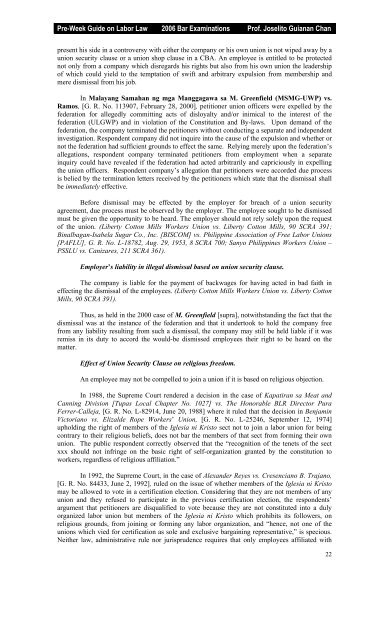
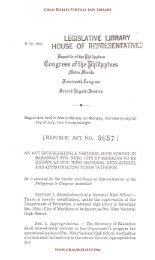
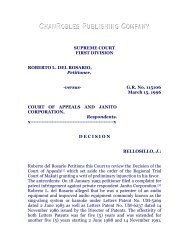
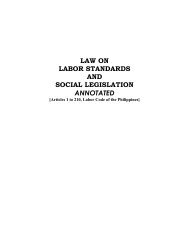
![Aurelio vs. NLRC, (221 SCRA 432 [1993]) - Chan Robles and ...](https://img.yumpu.com/51280528/1/190x245/aurelio-vs-nlrc-221-scra-432-1993-chan-robles-and-.jpg?quality=85)
